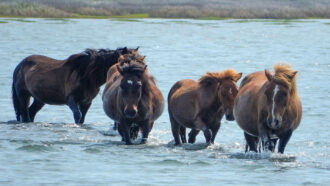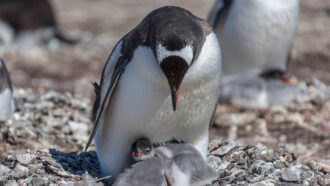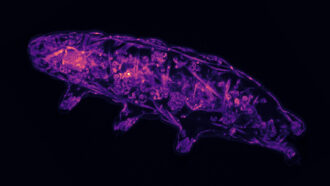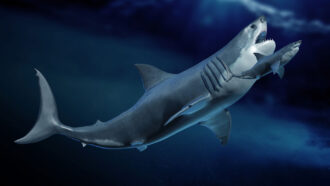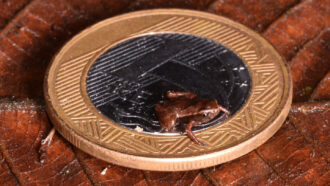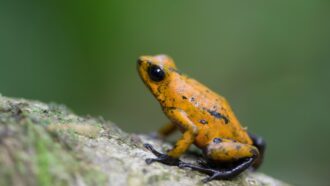Changing climate alters fish behavior
Study finds clownfish don’t swim away from scary sounds in future ocean conditions
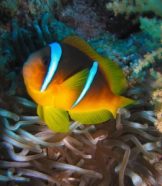
Life can be tough for a small, young clownfish living on a coral reef. Juvenile clownfish grow up to be bright orange with whitish stripes, like the stars of Finding Nemo. And to some hungry animals lurking around the reef, these youngsters look like dinner.
“When you’re a centimeter long as a fish, anything is a predator,” Steve Simpson told Science News. A centimeter is less than half the diameter of a dime.
Simpson is a fish ecologist at the University of Bristol in England. Ecologists study how organisms sharing a living space behave together, and how they affect their environments. Simpson recently worked on an experiment that looked at how changes to the ocean might affect clownfish.
In response to climate change, the water in the ocean is changing. The way scientists measure the change is to measure the pH of the water. The pH of a chemical reveals if a material is an acid or a base. Just as temperature tells you whether something is hot or cold, the pH can tell you whether something is an acid or a base. The pH of a substance is somewhere between 0 and 14. A neutral substance has a pH of 7. Acids have low pH, less than 7, and bases have high pH, more than 7. When you mix an acid and a base, they react with each other and produce a new substance with a pH somewhere in the middle of the scale.
Currently, the water in the ocean has a pH above 7, which means it’s basic. But in the past 200 years, the pH has been inching toward the more acidic end of the scale. This worrisome trend is called ocean acidification (see SNK story “Sea changes”). Scientists like Simpson are concerned about how sea life will respond to these changes. So Simpson’s team studied young clownfish in water with a pH lower than that found in today’s oceans. What the team found isn’t encouraging.
Young clownfish looking for a place to call home stay away from the daytime noise of reefs. To the clownfish, noisy reefs sound like predators out hunting. It’s a smart move to avoid such sounds: the fish can better avoid being eaten. Simpson and his colleagues wanted to know if clownfish would still avoid scary sounds (and water full of predators) in water with a lower pH.
The team put clownfish in an aquarium with underwater speakers installed at each end. The speaker at one end played the sounds of a reef in the daytime. The scientists watched to see where the fish swam.
Like clownfish in the wild, those raised in an aquarium filled with ordinary seawater swam away from the sounds. But then the team filled the aquarium with water at a lower pH, creating conditions similar to what scientists predict for oceans around the year 2050. In that water, the fish changed their behavior. They didn’t avoid the noisy end of the tank. Instead, they swam to and fro — they were just as likely to visit the noisy end as not.
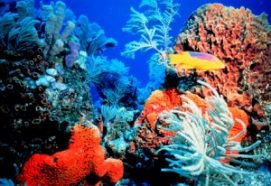
Clownfish that don’t avoid places where predators lurk may be more likely to end up a bigger fish’s dinner. The results of Simpson’s study suggest the colorful swimmers may face additional struggles in the future.
The scientists don’t know why more acidic water changes the behavior of the fish. That’s a good question for the next round of research. But Simpson and his colleagues don’t believe that the more acidic water made the fish go deaf. The team looked at the otoliths, or ear bones, of the fish and found they hadn’t changed size or shape.
Ocean acidification is happening quickly because of human activity. About 200 years ago, people started burning more fossil fuels, such as coal. This activity releases carbon dioxide into the air. Carbon dioxide insulates the planet and causes temperatures to rise. But some carbon dioxide in the air dissolves in the oceans, forming acids. The extra carbon dioxide in the air means extra acid in the water. As a result, the ocean’s pH is changing fast.
Scientists conduct experiments like Simpson’s to predict how ocean life will respond to climate change, and most of those studies point to bad news for marine life. In Finding Nemo, the clownfish survive their ordeal. In real life, scientists can’t assume that organisms like fish will adapt and figure out how to survive.
POWER WORDS (adapted from the New Oxford American Dictionary)
carbon dioxide A colorless, odorless gas produced by burning carbon and by respiration. It is naturally present in air and is absorbed by plants in photosynthesis, a chemical reaction that turns sunlight into food.
acid A chemical substance that can dissolve some metals and that reacts with bases to form salts. Acids usually taste sour.
reef A ridge of jagged rock, coral or sand just above or below the surface of the sea.
climate change Long-term, significant change in the climate of Earth. It can happen naturally or in response to human activities, including the burning of fossil fuels and clearing of forests.
ecology The branch of science that studies the relationships between organisms and between organisms and their physical surroundings.
fossil fuel A natural fuel such as coal or gas, formed in the geological past from the remains of living organisms.
